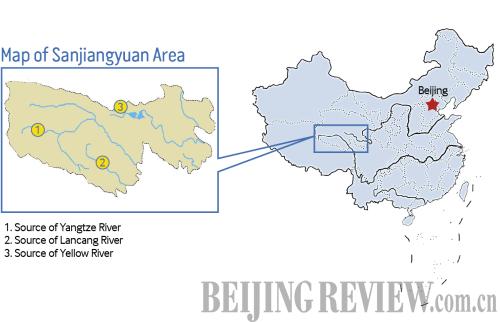|
So far, 3.78 million hectares of pastures have been closed to grazing, and 6,540 hectares of cultivated land have been converted into forests or grasslands, Li Xiaonan, the official in Qinghai, said.
Official statistics also show that a total of 55,773 residents in 10,733 households have been relocated from pastures into small cities and towns so as to protect grasslands from further degradation caused by human activities.
Most of the central and local governments' investment in protecting Sanjiangyuan has been used for ecological compensation, according to Wang Jinnan, Vice President of the Chinese Academy for Environment Planning under the Ministry of Environmental Protection.
Compensation is made both to protect the environment and to improve people's livelihoods, Wang said. For instance, residents affected by the closing of pastures are given subsidies for buying fodder for their livestock, and residents involved in converting farmland to forests or grasslands are compensated for seeds and crop yield, as well as some living costs.
Residents displaced by the Sanjiangyuan ecological protection project have also received subsidies for resettlement.
The Qinghai Provincial Government has made significant efforts to establish an ecological compensation mechanism.
Over the years, it has offered vocational training to farmers and herdsmen in Sanjiangyuan, and subsidized their purchase of production materials and fuels. The provincial government has also given out tuition grants and living allowances to children of local families in the compulsory educational stage or one year prior and three years after that stage, and supported farmers and herdsmen in starting their own businesses.
Enriching local people
After moving into the towns and cities, herdsmen have to change their lifestyle.
"Living in houses is better than living in tents. It is more convenient to visit doctors and go shopping, as well as for children to go to school," said Soibo Zhaxi, an immigrant in Madoi's Gyaring Township. But he also voiced concerns, saying, "For now, migrants can live on government subsidies. But what if the subsidies stop and consumer prices rise in the future?"
A sustainable ecological compensation mechanism should allow not only for the transfer of resources but the generation of new ones, said Fan Fengyu, Vice President of Changjiang and Huanghe Corp., a company that offers environmental solutions for water bodies such as the Yangtze and Yellow rivers.
In addition to fiscal transfers, Sanjiangyuan should be given help to adjust industrial structure according to the environment's carrying capacity and local characteristics, Fan said.
Fan suggests that incentives should be given to local farmers and herdsmen, who are mostly Tibetans, to engage in the production of Tibet-style ornaments, animal products and Tibetan medicine.
Local farmers and herdsmen are also engaged in Sanjiangyuan's ecological protection. In 2012 alone, Qinghai recruited nearly 10,000 local residents to manage and protect grasslands in the area.
From 2006, the government began to sign protection agreements with local residents, specifying their rights and responsibilities and the goals to be achieved.
Under the agreements, Tibetan herdsmen in the core zone of the Sanjiangyuan Nature Reserve can participate in patrolling, environment surveillance and animal monitoring, Ma Hongbo, a professor at Qinghai Provincial School of Administration, told Beijing-based Oriental Outlook magazine.
Wildlife in Sanjiangyuan has been effectively protected, which should be credited to government's generous investment and local residents' conservation actions, said Li Xiaonan.
Email us at: wanghairong@bjreview.com

| 